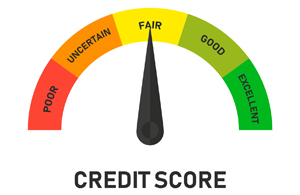
This fall PFCU members will be able to access their credit score just by logging onto to their online banking. Send your email address to creditunion@mypfcu.org to receive updates and other information.
In the mean time, there are a few main ways to get your credit score, including from a credit card or other loan statement, a non-profit counselor, or for a fee from a credit reporting agency.
You actually have more than one credit score. Credit scores are calculated based on the information in your credit reports. If the information about you in the credit reports of the three large consumer reporting companies is different, your credit score from each of the companies will be different. Lenders also use slightly different credit scores for different types of loans.
There are four main ways to get a credit score:
Check your credit card or other loan statement. Many credit card companies and some auto loan companies have begun to provide credit scores for all their customers on a monthly basis. The score is usually listed on your monthly statement, or can be found by logging in to your account online.
Talk to a non-profit counselor. Non-profit credit counselors and HUD-approved housing counselors can often provide you with a free credit report and score and help you review them.
Use a credit score service. Many services and websites advertise a “free credit score.” Some sites may be funded through advertising and not charge a fee. Other sites may require that you sign up for a credit monitoring service with a monthly subscription fee in order to get your “free” score. These services are often advertised as “free” trials, but if you don’t cancel within the specified period (often as short as one week), you could be on the hook for a monthly fee. Before you sign up to try one of these services, be sure you know what you are signing up for and how much it really costs.
Buy a score. You can buy a score directly from the credit reporting companies. You can buy your FICO credit score at myfico.com . Other services may also offer scores for purchase. If you decide to purchase a credit score, you are not required to purchase credit protection, identity theft monitoring, or other services that may be offered at the same time.
Some credit score sources provide an “educational” credit score, instead of a score that a lender would use. The CFPB published a report on the differences between educational scores and those used by lenders . For most people, an educational score will be close to the scores lenders use and can be helpful for consumers. But the scores can be quite different for some. Our report found a meaningful difference for one out of four people. When choosing where to get your credit score, find out what kind of score it is.
TIP
Always get and review your credit reports, which you can do at no cost to you at www.AnnualCreditReport.com . Your credit scores are calculated based on the information in your credit reports. If there are errors on your credit reports, they can reduce your scores unnecessarily.
TIP
If you are shopping for a mortgage, knowing one of your credit scores can help you find out the range of mortgage rates you can expect.
This information has been provided by the Consumer Financial Protection Bureau
https://www.consumerfinance.gov/



